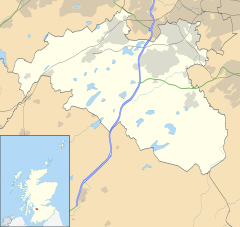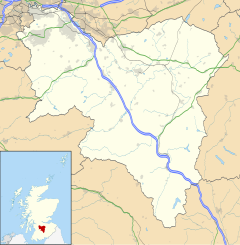
Summary
Waterfoot (Scots: Watterfit)[2] is a village in East Renfrewshire, Scotland. It is on the B767 road between Clarkston and Eaglesham, which are 1 mile (1.6 km) to the north and south respectively, while Newton Mearns is about 2 miles (3 km) to the west and East Kilbride about 5 miles (8 km) to the southeast.[3] The village shares a community council with the neighbouring community of Eaglesham, the Eaglesham and Waterfoot Community Council meets in Eaglesham on a monthly basis.[4]
Waterfoot
| |
|---|---|
 Waterfoot Bridge | |
 Waterfoot  Waterfoot Location within East Renfrewshire  Waterfoot Waterfoot (Glasgow council area)  Waterfoot Waterfoot (East Renfrewshire) | |
| Population | 1,340 (mid-2020 est.)[1] |
| OS grid reference | NS569546 |
| • Edinburgh | 44 mi (71 km) ENE |
| • London | 340 mi (550 km) SSE |
| Community council |
|
| Council area | |
| Lieutenancy area | |
| Country | Scotland |
| Sovereign state | United Kingdom |
| Post town | Glasgow |
| Postcode district | G76 |
| Dialling code | 0141 |
| Police | Scotland |
| Fire | Scottish |
| Ambulance | Scottish |
| UK Parliament | |
| Scottish Parliament | |
During the Second World War, deputy leader of the Nazi party Rudolf Hess, crash landed in Floors Farm, west of the village.[5] He was arrested and held in custody until after the war, when he was tried at the Nuremberg trials.
The audio equipment manufacturer Linn Products has its factory to the southwest of Waterfoot.[6]
Development edit
The Glasgow Southern Orbital road (part of the A726) passes just to the south of Waterfoot.[6] The village lies on the west bank of the White Cart Water, and the original settlement grew up around a farm, mill (Dripps Mill) and smithy.[7] One early record of the village is in Timothy Pont's maps of Scotland (1583–1596).[8]
Waterfoot today is purely residential in character, having expanded as a commuter dormitory village, primarily in the latter half of the 20th century.[7] The 2011 census reported that Waterfoot had a population of 1,280.[9] There was some controversy in 2012 when East Renfrewshire Council wanted to sell Waterfoot Park to the housebuilder CALA Homes so that they could build 29 homes.[10] A new park, Inky Pink Park, was created using funds provided by CALA to mitigate for the loss of Waterfoot Park when it was built on.[11]
Notable people edit
Winifred Drinkwater, the world's first female commercial airline pilot, was born in Waterfoot on 11 April 1913.[12] Neil Munro, Scottish author, lived in Waterfoot during the early years of the 20th Century.
Gallery edit
-
Weir White Cart Water
-
Brackenrig Burn
-
"Floors Farm" near Waterfoot
References edit
- ^ "Mid-2020 Population Estimates for Settlements and Localities in Scotland". National Records of Scotland. 31 March 2022. Retrieved 31 March 2022.
- ^ Andy Eagle (27 February 2003). "The Online Scots Dictionary". Scots-online.org. Retrieved 26 September 2013.
- ^ "Measure Distance on a Map". Free Map Tools. Retrieved 9 March 2020.
- ^ "Eaglesham and Waterfoot Community Council". East Renfrewshire Council. Retrieved 9 March 2020.
- ^ Dominic Midgley (11 May 2016). "The day Hitler's deputy fled to Britain". Daily Express. Retrieved 9 March 2020.
- ^ a b "Linn - Travel Directions". Linn Products Limited. Retrieved 9 March 2020.
- ^ a b "Waterfoot". Gazetteer for Scotland. Retrieved 9 March 2020.
- ^ "Pont Maps of Scotland". National Libraries of Scotland. Retrieved 9 March 2020.
- ^ "Waterfoot". www.citypopulation.de. Retrieved 9 March 2020.
- ^ Gillian Loney (7 October 2012). "Battle continues over Waterfoot". The Extra. Retrieved 9 March 2020.
- ^ "Waterfoot New Inky Pink Park". Eaglesham & Waterfoot Community Council News. Eaglesham & Waterfoot Community Council. 10 January 2020. Retrieved 9 March 2020.
- ^ Elizabeth L. Ewan; Sue Innes; Sian Reynolds; Rose Pipes, eds. (2007). Biographical Dictionary of Scottish Women. Edinburgh University Press. p. 102. ISBN 978-0748626601.
External links edit
- Waterfoot at Gazetteer for Scotland
- Busby & Waterfoot - Illustrated Guide


